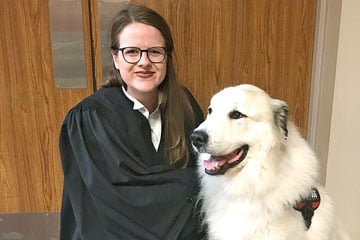
A therapy dog was allowed in court to sit at the feet of the plaintiff while she testified in an Ontario Superior Court civil jury trial late last fall in what is believed to be a first in the province for this type of assistance in personal injury litigation.

A therapy dog was allowed in court to sit at the feet of the plaintiff while she testified in an Ontario Superior Court civil jury trial late last fall in what is believed to be a first in the province for this type of assistance in personal injury litigation.
The approval, granted by Justice Elizabeth Quinlan, also highlights the different framework in terms of measures to assist children or other vulnerable witnesses in civil trials compared to criminal proceedings.
“There really is nothing. It needs to catch up,” says Troy Lehman, who acted for the plaintiff in Little v. Floyd Sinton Ltd., where a civil jury in Barrie awarded $7 million in damages as a result of a brain injury suffered in a 2011 school bus accident.
The Criminal Code contains provisions where a court can order that a vulnerable witness be permitted to testify by closed circuit television or behind a screen.
As well, in some jurisdictions in Ontario, specially trained “facility” dogs are used to accompany child witnesses in the witness box while they testify in criminal proceedings.
Lehman, partner at Oatley Vigmond LLP, says there should be similar options for these witnesses testifying in civil litigation, especially if it is in front of a jury.
“Why wouldn’t you have this on the civil side?” Lehman asks.
“With a child witness, you go up there and try to be gentle,” he explains, but there is not any formal process as to how these examinations should be conducted.
There is very little legal precedent in Canadian courts on whether therapy dogs can be permitted in court to put a witness at ease, notes Erin Murray, associate at Oatley Vigmond, who also acted for the plaintiff. Two provincial court rulings in British Columbia have approved therapy or “cope” dogs to be in court in criminal proceedings, but there are no reported decisions in Ontario on this issue.
The defence in the Barrie case ultimately did not challenge the request for Fergus, a five-year-old Great Pyrenees, to be present in court while the plaintiff testified for a total of about three hours.
The plaintiff, who suffered her injuries when she was 13, had anxiety issues about testifying and had previously interacted with the animal, which was trained as a cope dog.
“It was the dog’s first court appearance,” says Murray, but it was not a distraction to the jury.
“The dog was hidden by the witness box,” at the feet of the plaintiff, she explains.
The trial judge also gave an instruction to the jury about why the dog was in court during the plaintiff’s testimony. Quinlan explained that this was to help the plaintiff give her evidence.
However, the judge said, “You are not to draw any inference of any kind from the use of this procedure.”
“The use of the procedure also has nothing to do with how much or how little you may believe of or rely on Ms. Little’s evidence in deciding this case,” the judge stated.
Amendments to the Criminal Code, enacted more than a decade ago, stated that the purpose was to “encourage the participation of witnesses” in the criminal justice system, including children or other vulnerable individuals.
The changes did not address the use of specially trained dogs in court, but since the provisions came into force, there have been programs put in place for this service in some parts of the province.
The Child Witness Program in London, Ont. has a specially trained facility dog called Merel to assist children who testify in criminal proceedings.
“She is not connected to a specific person,” says Rachel Braden, manager of the program and handler of the dog.
“She will sit with her head on the child’s lap while testifying.” For a child witness, testifying often occurs outside of the courtroom in a closed-circuit television room.
“They are trained to have a minimal presence,” Braden says of the support dog.
“She will not move or make a sound while the witness is testifying.”
To date, there has not been any opposition from defence counsel about having the facility dog assist child witnesses, she points out.
Merel has not yet participated in a jury trial, yet Braden says that, because of her training, she would not be a distraction.
There have been inquiries from lawyers involved in civil litigation about whether the dog could assist a witness, says Braden.
“We are willing as long as they are willing to pay the expenses,” she explains.